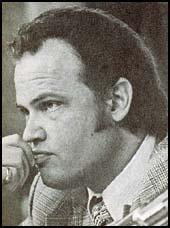Fred D. Thompson

Fred Dalton Thompson was born in Sheffield, Alabama, on 19th August 1942. Thompson attended Memphis State University where he earned an undergraduate degree in philosophy and political science in 1964. He also studied at Vanderbilt University Law School before eventually became a U.S. attorney for Tennessee's middle district and served as a re-election campaign manager for Howard Baker.
In 1973 he was appointed the minority counsel for the Senate Select Committee on Presidential Campaign Activities in its investigation of the Watergate scandal.
In his book At That Point in Time (1975) Thompson revealed that during the investigation Thompson telephoned Fred Buzhardt, the lawyer representing Richard Nixon, and tipped off the White House that the committee knew about the taping system and would be making the information public.
In his book Thompson argues that: "Even though I had no authority to act for the committee, I decided to call Fred Buzhardt at home (to inform him about the tapes). I wanted to be sure that the White House was fully aware of what was to be disclosed so that it could take appropriate action."
Thompson worked as an attorney, with law offices in Nashville and Washington. This included being Special Counsel to the Senate Intelligence and Foreign Relations Committees (1980-1981).
Thompson has also worked as an actor and his films have included No Way Out (1987), Feds (1988), Fat Man and Little Boy (1989), Die Hard 2 (1990), Cape Fear (1991) and In the Line of Fire (1993).
Thompson was elected as a Republican to the United States Senate in the 8th November, 1994. He was reelected in 1996 for the term ending 3rd January, 2003.
Primary Sources
(1) Michael Kranish, Boston Globe (4th July, 2007)
The day before Senate Watergate Committee minority counsel Fred Thompson made the inquiry that launched him into the national spotlight - asking an aide to President Nixon whether there was a White House taping system - he telephoned Nixon's lawyer.
Thompson tipped off the White House that the committee knew about the taping system and would be making the information public. In his all-but-forgotten Watergate memoir, "At That Point in Time," Thompson said he acted with "no authority" in divulging the committee's knowledge of the tapes, which provided the evidence that led to Nixon's resignation. It was one of many Thompson leaks to the Nixon team, according to a former investigator for Democrats on the committee, Scott Armstrong , who remains upset at Thompson's actions.
"Thompson was a mole for the White House," Armstrong said in an interview. "Fred was working hammer and tong to defeat the investigation of finding out what happened to authorize Watergate and find out what the role of the president was."
Asked about the matter this week, Thompson -- who is preparing to run for the 2008 Republican presidential nomination - responded via e-mail without addressing the specific charge of being a Nixon mole: "I'm glad all of this has finally caused someone to read my Watergate book, even though it's taken them over thirty years."
The view of Thompson as a Nixon mole is strikingly at odds with the former Tennessee senator's longtime image as an independent-minded prosecutor who helped bring down the president he admired. Indeed, the website of Thompson's presidential exploratory committee boasts that he "gained national attention for leading the line of inquiry that revealed the audio-taping system in the White House Oval Office." It is an image that has been solidified by Thompson's portrayal of a tough-talking prosecutor in the television series "Law and Order."
